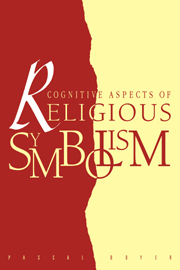Book contents
- Frontmatter
- Contents
- List of contributors
- I Cognitive processes and cultural representations
- II The structure of religious categories
- III Acquisition and belief fixation
- 7 Sign into symbol, symbol as sign: cognitive aspects of a social process
- 8 Talking about souls: the pragmatic construction of meaning in Cuna ritual language
- IV The structure of ritual action
- References
- Index of names
- Subject Index
8 - Talking about souls: the pragmatic construction of meaning in Cuna ritual language
Published online by Cambridge University Press: 05 November 2011
- Frontmatter
- Contents
- List of contributors
- I Cognitive processes and cultural representations
- II The structure of religious categories
- III Acquisition and belief fixation
- 7 Sign into symbol, symbol as sign: cognitive aspects of a social process
- 8 Talking about souls: the pragmatic construction of meaning in Cuna ritual language
- IV The structure of ritual action
- References
- Index of names
- Subject Index
Summary
Instinctively we use language rightly; but to the intellect this use is a puzzle.
(Wittgenstein 1930[1980]: 1)The anthropological study of ritual symbolism has payed little attention to the transformations of meaning that the ritual use of language can bring about. In this chapter, I will study the case of the Cuna society, where a complex religious category, usually translated as ‘soul’ or ‘spiritual presence’, may seem almost meaningless in ordinary talk, and yet plays a crucial role in the shamanistic representation of the human experience. My claim will be that such a situation is caused by a complex web of relationships between the ritual chanter, the ill person, the auxiliary spirits and the shamanistic chant. These pragmatic conditions both constrain the semantic field of the notion and generate the principles of its use. Although the performative aspect of ritual language has been clearly recognised in the literature (Bloch 1974; Tambiah 1985), anthropologists generally lay stress on the ontological or cosmological aspects of ritual discourse. A good example of this situation is the stance taken by Tambiah, who introduced the ‘performative’ approach in the study of ritual. Although Tambiah believes that ritual is ‘a medium for … creating and bringing to life’ (1985: 129) what he calls the ‘cosmological scheme’ of a culture, he still relegates the pragmatic aspects of ritual to the restricted, secondary function of producing ‘indexical meanings’ (ibid., 165) about the social context of ritual action. A pragmatic analysis of a ceremonial language, thus, can only refer to the rank, or social status, of the ritual actors.
- Type
- Chapter
- Information
- Cognitive Aspects of Religious Symbolism , pp. 165 - 182Publisher: Cambridge University PressPrint publication year: 1993
- 11
- Cited by



